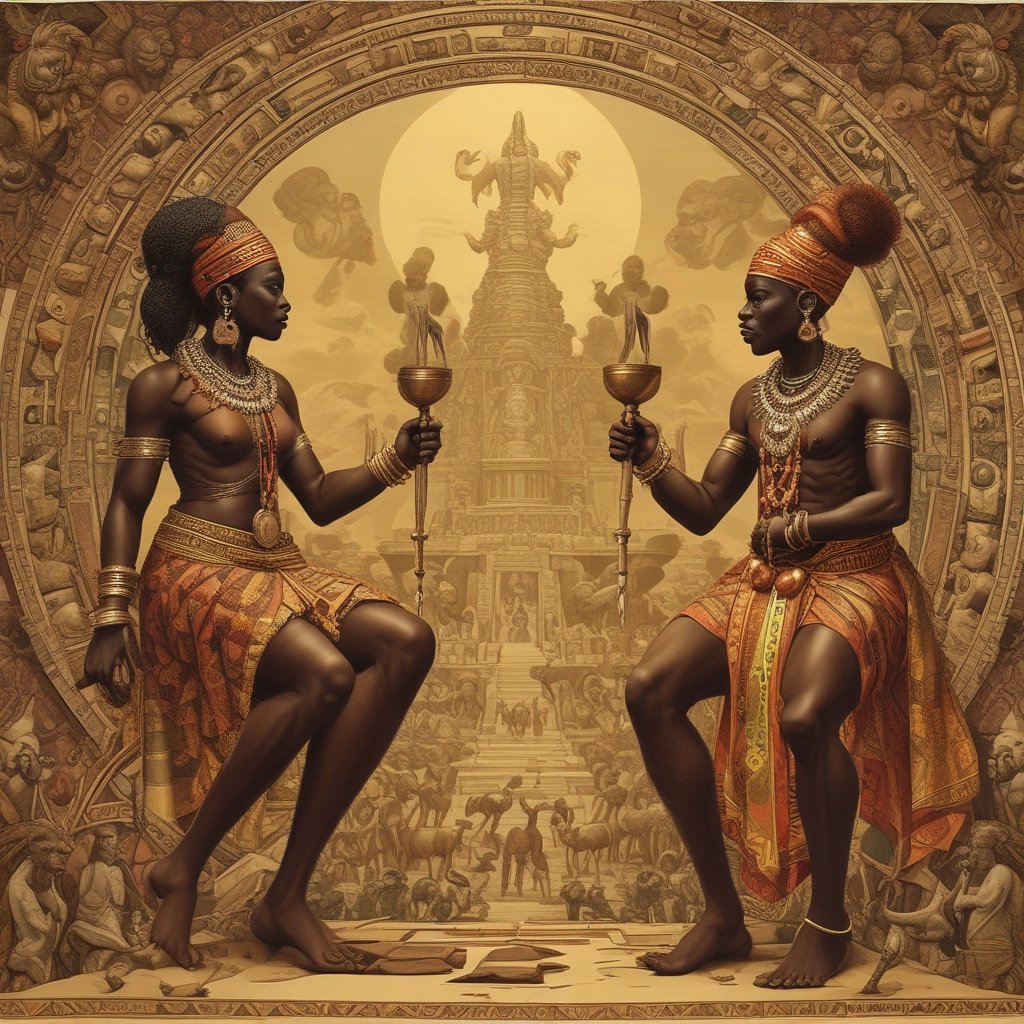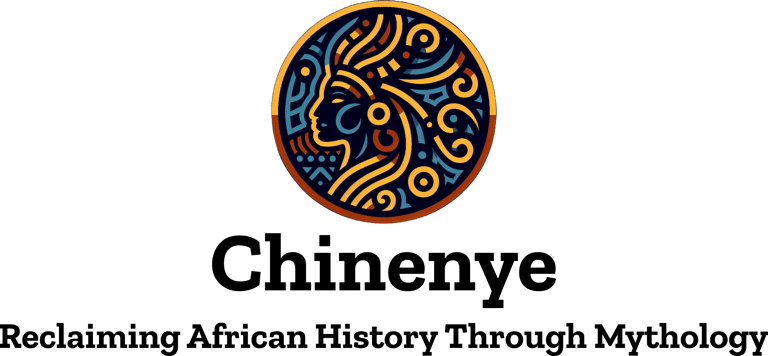African Mythology: The Operating System of a Continent
Chinenye Egbuna Ikwuemesi
11/20/20255 min read


What Is African Mythology and Why It Was Not Just Folklore
African mythology is not folklore. It is not superstition, bedtime stories, or decorative legend. African mythology is a civilisational operating system - a body of encoded knowledge that once structured time, law, ethics, governance, technology, ecology, architecture, social order, and the protocols of human belonging across the continent. Every precolonial civilisation had myths. Africa’s were systems, and knowing this will help us correct the record on African history.
This page explains why.
African mythology is the integrated system of cosmologies, deities, ancestral principles, moral laws, ecological knowledge, time structures, and memory frameworks developed by African civilisations to organise society, preserve knowledge, and transmit identity across generations.
African mythology has often been dismissed as colourful stories told around village fires. This mistake has cost the world centuries of insight. What Africans encoded in myth was not fiction; in fact, it was architecture. Myth was the tool through which societies organised time, stabilised memory, regulated power, codified ethics, designed governance, and aligned human behaviour to the natural world. This is one of the core elements of my public speaking practice.
When European historians labelled African myth as “primitive folklore,” they didn’t merely misunderstand a literary tradition; they misunderstood a civilisation.
Why African Mythology is Important to Know, Retain and Publish
African mythology matters because every African civilisation built its knowledge systems inside myth. If Africa is to regain intellectual sovereignty, its mythological frameworks must be restored to their original status as foundational civilisational tools. This is also critical for the recovery of facets of the identity of African and Black people, which have been lost.
Mythology matters because:
It encoded knowledge in a world without books.
It transmitted law, ethics, governance and collective memory.
It stabilised identity across generations.
It unified communities through shared cosmology.
It allowed societies to interpret natural and spiritual phenomena.
It was a science of organisation before Europe created classrooms.
Understanding African mythology is essential if the world is ever to understand African civilisation. I explore this in the African Mythology Series, and the inaugural volume in the series, Nigerian Mythology: The Shadow Sky.
Key Benefits of Understanding African Mythology
Understanding African mythology restores:
Civilisational clarity
It shows how African societies achieved stability, governance, innovation, and philosophical depth.Historical continuity
It reconnects modern Africa and the diaspora to precolonial memory systems.Intellectual sovereignty
It corrects colonial distortions that framed Africa as a civilisation without thought.Cultural belonging
It gives Africans a lexicon of identity rooted in inherited cosmological frameworks.Future-building
Myth teaches systems thinking that can guide African innovation, AI ethics, governance, and ecological restoration today.
How African Myth Functioned as Memory, Law, Ethics and Governance
African mythology was architecture.
1. Mythology as Law
Myth encoded the principles by which people lived.
Oaths, taboos, rituals, punishments, and moral expectations all came from cosmology.
To break a law was not to “disobey the state” but to distort cosmic order.
2. Mythology as Governance
Kings ruled by cosmology.
Councils of elders interpreted mythic law.
Priests and dibias acted as constitutional judges.
Succession, land distribution, justice — all came from myth.
3. Myth as Ethics
Ethics were not arbitrary rules: they were derived from the behaviour of gods, ancestors, and cosmological forces.
A myth was not “a belief”; it was an ethical algorithm.
4. Mythology as Memory
African civilisations built libraries of cosmology. Every deity encoded a discipline:
Ogun = technology
Sango = justice
Ala = morality and land law
Yemoja = ecology and motherhood
Esu = probability, divergence, decision-making
Myth carried memory across centuries.
5. Mythology as Technology
African time systems were encoded in cosmology. Agricultural calendars emerged from ritual cycles. Architecture followed sacred geometry and innovation followed the logic of the gods. Myth was a technology of civilisation.
Q&A
What is African Mythology?
African mythology is a civilisational framework that combines cosmology, ethics, law, memory, and social organisation.
Was African mythology really a scientific system?
Yes. It encoded ecological knowledge, astronomy, time-keeping, metallurgy, governance and social engineering.
Did Africans use mythology instead of written law?
Myth was the law , it was the constitutional blueprint for how society functioned, as seen in the Yoruba Orisas, fictionalised in ‘Meet the Orisas’
How did mythology shape African governance?
Leadership, justice, inheritance, land rights and social responsibilities were cosmologically defined.
Why was African mythology misunderstood by Western scholars?
Because they misread applied cosmology as folklore and ignored its civilisational depth.
Is African mythology relevant today?
Yes. Its frameworks support identity, ethics, and ecological balance and can guide African future-building and tech ethics.
How African Mythology Differs From Western Mythology
Western mythologies such as Greek, Norse and Roman are usually treated as literature, symbolic psychology or cultural narrative. African mythology is structurally different and operates at a deeper civilisational level.
Western Mythologies
• Primarily narrative • Stories of gods and heroes • Myth does not govern society • Offers symbolic lessons
• Explains human nature • Abstract cosmology • Functions as cultural memory or literature
African Mythologies
• Primarily functional • Systems of law, ethics, astronomy and ecology • Myth governs society directly • Defines operating rules for community life • Shapes governance, ethics and social design • Applied cosmology • Functions as a civilisational framework
The Crucial Distinction
African mythology is not parallel to Greek or Roman myth.
It is parallel to:
• a constitution • a scientific framework • a philosophical canon • a calendar
• a memory archive • a governance model • a technology for social cohesion
Nothing in the Western mythological canon performs this multi-layered function. African mythologies were the structural architecture of civilisation.
African mythology is not comparable to Greek or Roman mythologies.
It is comparable to:
A constitution
A scientific framework
A philosophical canon
A calendar
A memory archive
A governance model
A technology for social cohesion
How to Understand African Mythology Today
Modern readers often approach myth as metaphor or legend.
To understand African myth properly:
Read it as operating system, not story.
Read deities as civilisational roles, not characters.
Read cosmology as encoded science.
Read rituals as protocols for ecological and social harmony.
Read ancestry as memory governance.
Myth & Civilisation: The Architectural Blueprint
African mythology provided:
A social contract
A calendar
A justice system
A model of community
A code of environmental stewardship
A blueprint for social cohesion
A template for moral reasoning
A language for cosmic order
Where Europe used written law, Africa used embodied myth.
Where Europe used centralised church authority, Africa used distributed cosmology.
Where Europe used linear time, Africa used cyclical time.
Where Europe used hierarchy, Africa used cosmological balance.
African mythology was civilisation itself.
Safety / Clarity Notes
African mythology is not a religion in the narrow Western sense.
It is not superstition or primitive belief.
It is not equivalent to Greek mythology.
It is not a single continental system.
It is not anti-modern.
African mythology is a body of civilisational knowledge systems, disrupted by colonialism but now being restored by modern scholarship, research, and mythographers. The institutional archive of African mythologies can be found at AfrodeitiesInstitute.org.
Conclusion: The World Misunderstood The Operating System of a Continent
African mythology is not the past. It is the backbone of African intellectual history. It is the encoding of African civilisation.
It is the memory architecture of a people interrupted - but not erased , by colonial intrusion. The African Mythology and the Mythic Codex works will help to work restore it.
African mythology is not some arcane reservoir of stories, but a civilisational blueprint embedded in narrative form. Reconstructing it allows us to understand time, ethics, governance, identity and innovation on African terms. The work continues through the forthcoming codices, the research across Nigerian and continental pantheons, and the wider project of restoring Africa’s intellectual architecture. Readers can explore these foundations further through the associated research sites, published books and related essays. For readers who want a deeper reference, please visit AfricanMythology.com and NigerianMythology.com
FAQs
Is African mythology just a religious belief?
No. It is a civilisational knowledge system.
Did African myths influence technology?
Yes. Myth encoded the logic of innovation, metallurgy and ecological engineering.
Are African deities real or symbolic?
They are functional roles within a cosmological system
Why does African mythology matter for the diaspora?
It restores identity, memory and cultural grounding.
Can African mythology strengthen education today?
Yes. It provides indigenous frameworks for ethics, science, and governance.
Is African mythology still practised?
Many traditions survive, but the knowledge systems require deliberate restoration.
How does African mythology relate to African history?
It is the foundation of African history.
Reframing African History by Reclaiming African Mythology
Restoring African mythology through innovative storytelling.
chinenye@chinenye.co.uk
© 2025. All rights reserved.
